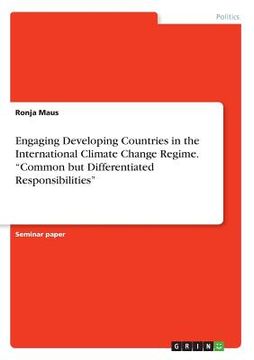Engaging Developing Countries in the International Climate Change Regime. Common but Differentiated Responsibilities
Synopsis "Engaging Developing Countries in the International Climate Change Regime. Common but Differentiated Responsibilities"
Seminar paper from the year 2011 in the subject Politics - Environmental Policy, grade: 1,7, University of Bamberg, language: English, abstract: One single state is not able to solve the global climate problems. Instead, only an international cooperation comprising as many states as possible can contribute to a protection of a collective good such as a stable climate. This term paper examines the international climate change regime. Keohane & Victor identify this institution as a "regime complex", which compromises several institutional elements and initiatives such as, for instance, the UN Legal Regime, bilateral initiatives, clubs, experts assessments etc. (Keohane /Victor 2011: 10). In my term paper I will focus on the element of the efforts undertaken by the United Nations. Although nearly universal in membership and probably the most famous, its success is so far rather limited, Keohane & Victor even describing it as "ultimately symbolic" (Keohane / Victor 2011: 10). The reason for its ineffectiveness is that many states still refuse to engage and agree upon binding commitments. The biggest group of these defectors are the developing countries, who will be placed in special focus in this paper. My key question will be: How should the regime be designed to engage states into the endeavour of climate protection? For soundly answering this question, in a first my selected section of the climate change regime complex - the UN Legal Regime - will be presented. After that the theoretical background will be introduced; the Rationalist Cooperation Theory. Further two game-theoretical models are applied for examining issues of an international cooperation in the field of climate protection. Obstacles and reasons why some states refuse to cooperate can thus be explained. On the basis of the insights from this, this paper focuses on how the regime should be designed to guarantee an implementation of the goals of the climate change regime as well as the complianc

